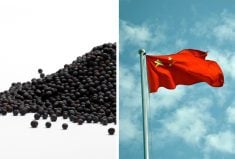LILONGWE (Reuters) – A dry spell and worsening pest
infestation are threatening Malawi’s staple maize crop,
prompting President Peter Mutharika on Friday to call on
government officials to lead prayers for rain.
Impoverished Malawi is periodically hit by food shortages as
the tropical southern African country relies heavily on rain-fed
agriculture and most of its maize is grown on small plots by
subsistence farmers.
The current dry spell has been exacerbated by an outbreak of
crop-munching fall armyworms, a pest from Latin America that
Read Also

Canada, Mexico look beyond U.S. as agri-food trade pact expands
Earlier this week Heath MacDonald, Canada’s Minister of Agriculture and Agri-Food and Mexico’s Secretary of Agriculture and Rural Development, Julio Berdegué, met to discuss bilateral relations and strengthen cooperation and trade ties between the two countries.
In a statement, Mutharika asked cabinet ministers and all
senior government officials to lead prayer vigils at mosques and
churches starting on Friday and throughout the weekend.
“The President urges the faith community and all Malawians
to pray for good rains and a productive season this Friday,
Saturday and Sunday,” the statement said. Such a call can have
resonance in deeply religious Malawi, which has high rates of
church and Mosque attendance.
Official estimates of the damage to maize by both the
drought and armyworms are underway, government and farmer
organisations have said.
The president declared the armyworms a national disaster in
December after it was discovered that they had spread to 20 of
Albert Changaya, a senior official in the department of
agriculture, told journalists the armyworm infestation had
spread from an initial 35,000 hectares to 206,000 hectares of
maize.
Malawi’s maize production in the 2016/17 farming season rose
a third to 3.2 million tonnes. The surplus harvest led to maize
prices falling and contributed to lower inflation as food
accounts for 50.1 percent of Malawi’s CPI (consumer price
inflation) basket.
Malawi’s consumer inflation slowed to 7.1 percent
year-on-year in December from 7.7 percent in November, the
National Statistical Office said on Wednesday, with food
inflation easing to 4.3 percent from 4.7 percent.
The Tobacco Association of Malawi said separately on
Thursday it was undertaking field estimates of the cash crop
amidst the drought. Tobacco is a key export earner.














